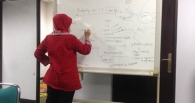General Budget Support to the Government of Malawi
A Mokoro Assignment
Sarah Holloway
17 February 2014
/
- 0 Comments
Perhaps I should introduce myself as this is my first contribution to the Newsletter… and it will tell you about my first assignment for Mokoro. I may be new to Mokoro, but I’m certainly not new to this business.. with almost 20 years and 35 countries under my belt.. I was obviously just a bit slow on the uptake in getting to know Mokoro!
I have been working on public financial management (PFM) issues since my first job at the National Audit Office, then making my way on through CIPFA, Price Waterhouse (in various locations) and Oxford Policy Management and finally to the frightening world of self-employment. An interesting set of circumstances and experiences brought me to my current situation which involves living on the little paradise Caribbean island of Montserrat, from where I make work trips to interesting places – which helps to remind me that Montserrat really is paradise (more of this wonderful lifestyle in a later edition if anyone is interested!?).
My first Mokoro assignment was a review of the Common Approach to Budget Support (CABS) – the name for the processes and mechanisms used to support the provision of General Budget Support (GBS) to the Government of Malawi (GOM). The CABS mechanism was developed by a group of donors to manage and review the provision of budgetary support to Malawi. The current group members are: the African Development Bank (AfDB), DFID (UK), the European Union (EU), Germany, Norway, and the World Bank, with the IMF, UNDP and Ireland having the status of ‘observers’. Budgetary aid (GBS and Sector Budget Support) accounts for around 40% of every GOM annual budget – so without wishing to state the obvious – the effectiveness of the CABS mechanisms matters – to GOM, the people of Malawi and the donors.
DFID Malawi, who had just taken over Chairmanship of the CABS group on behalf of the donors, commissioned this work. The findings and recommendations were intended to enable CABS donors to make an informed decision on continuing budgetary support to Malawi through the CABS mechanism, or on whether other measures should be considered (such as providing technical assistance, or further sector support).
The main objective was to undertake an independent review of the successes and short-comings of finance channelled through the CABS mechanism and to assess how effective the CABS mechanism has been over the last 3–4 years for channelling budgetary assistance to GOM in terms of: fostering better co-ordination among budget support donors; improving economic management and service delivery, strengthening governance and public finance management, and enhancing mutual accountability; and strengthening donors’ relationships and dialogue with GOM. The review also looked at the content and format of the Performance Assessment Framework (PAF), and compared it against examples in other countries.
So, this all gave me the chance to make my first visit to Malawi, where I had to confess on many occasions that I had actually lived right next door in Zambia for two years and never managed to cross the border. The journey from Montserrat to Malawi is an interesting one – four flights and two days… but to be fair, the journey to almost anywhere from Montserrat is an interesting one!
It was two weeks of running around Lilongwe interviewing a very wide range of people, and gradually developing ideas and recommendations and sharing them with donors as I went along. A fairly gruelling schedule.. but for reference for anyone travelling to Lilongwe, made much easier by the fact that I got to retire each evening to the wonderful Wendels Guest House – a lovely home from home. But be warned, one of the owners is a trained chef and the wonderful food will put significant pressure on your waistband after two weeks.. unless you have more self-discipline than me!
Some clear conclusions and recommendations emerged – agreeing a single set of recommendations with all the different stakeholders was always going to be more challenging. Everyone agreed that things could be improved.. but opinions differed about the best (and most acceptable) solutions.
In summary, it seemed that CABS has been effective in fostering better co-ordination among budget support donors but there is still scope for further improvement. CABS has also supported better co-ordination between CABS donors and GOM, and more widely among the donors, through the role of observers in CABS. Harmonisation and coordination among donors is evidenced by the production of a jointly agreed CABS Issues Paper, Aide Memoire and a single PAF. However, key differences in donors’ emphasis, priorities and objectives remain, due to factors external to GOM and CABS (as in most development environments).
CABS has enhanced mutual accountability and succeeded in raising the profile of some key policy issues, but challenges remain in translating this into improved service delivery and GOM outcomes. To be fair, it has been a difficult period for predictability of GBS as a result of problems with the political environment and public finance pressures on donors. However, CABS has been successful in supporting GOM through the fiscal stabilisation process and in the development and funding of the Public Financial and Economic Management Reform Programme (PFEM RP), but CABS has not engaged GOM in an effective dialogue about the broader Public Service Reform process.
CABS has been effective in strengthening donors’ relationships and dialogue with GOM, but the dialogue has become diluted away from key policy issues. CABS has provided dialogue access to an increasingly wide range of stakeholders (non GBS donors, civil society and the media), which compensates for the weakness or absence of other opportunities for dialogue with GOM.
In the light of all this, the recommendations identified a number of immediate opportunities to make CABS processes and mechanisms more effective, including better organisation and management of the CABS group, strengthening of the CABS review processes (by more clearly applying membership criteria, making the review Issues Paper more strategic and results-oriented, making the PAF more strategic and longer-term in focus and ensuring that the Aide Memoire includes information about key issues discussed, conclusions reached and agreed actions to address problems).
In the medium to long term and dependent on other factors, such as continued political stability and the success of on-going reform programmes, CABS could revert to being for GBS donors only, with a proposed new Development Cooperation Strategy delivering robust dialogue and a performance review framework . CABS could also have much greater engagement in the related issues of public service reform and performance improvement, and the planned introduction of a Medium Term Expenditure Framework (MTEF) approach would provide opportunities for detailed engagement in policy review, planning, and budget preparation.
Now the fun bit. Often when I am doing long-term institutional development work, I try to do something a bit more grass roots and instantly rewarding. A week before I was due to leave I was giving a talk about my career to the good ladies of Montserrat at a Coffee Morning event. I proposed a small collection to do something school related in Malawi and left home with about £200 in donations. I took local advice on the best way to spend the money and was given a great contact by the Head of DFID Malawi, who put me in touch with a local branch of a UK charity called Chance for Change. They provide support to disadvantaged children and young people through a variety of local programmes. Check out their website at www.chanceforchange.org.uk.
They facilitated the donation by putting me in touch with Kaliyeka primary school in Lilongwe. This is in a very deprived area, a “high-density” housing scheme, with high levels of unemployment and high rates of HIV infection. There are 7000 pupils at the school which is very under-resourced. I visited the school on the Saturday before I left and was hosted by the Headmistress who gave me a tour of the school and accepted the school supplies from us. The modest amount of money bought: 800 exercise books, 1100 pens, 100 pencils and 10 boxes of coloured crayons. A little goes a long way in Malawi!
A month after my return, I was asked to do a second visit to Malawi. The Terms of Reference involved presenting my report to a full CABS Review Meeting, facilitating final decisions on the recommendations and doing more work on implementation….. how hard could that be? So, I said yes. As it turned out, life in Malawi was about to become very interesting. Within days of the second input being agreed, the Budget Director was shot, the President sacked the entire government and details of a very disturbing financial scandal began to emerge – the computerised financial management system (IFMIS) was by-passed, leading to the misappropriation of significant amounts of public money. The issues, and therefore the focus of the second visit, became very different!!
The government had initiated urgent remedial actions, including tightening system security, putting in place arrangements for the independent oversight of the Accountant General’s Department (AGD) and putting together a short-term PFM Action Plan in consultation with the donors. I spent my first few days working with a great team in DFID Malawi and the wider CABS donor group to prepare ToRs for some emergency PFM technical assistance and some of the papers for the Review Meeting, including developing what came to be called the “Extraordinary PAF” which included a very specific set of PFM-strengthening measures over a six-month period, and a very chunky document outlining a fully comprehensive PFM reform action plan for the short, medium and long term. In response to the loss of confidence in GOM PFM systems, the donors had decided to suspend all budgetary aid, so we needed a firm basis for discussions on the way forward. The run up to the formal GOM/Donors CABS Review Meeting was a very interesting time to be around, including the tricky task of agreeing an approach to the meeting with the new Minister of Finance. The meeting went well (all things considered!) and as a consequence the motivation for implementing some of my CABS Review Process and Mechanism Report recommendations was strengthened. As one specific example, a much more strategic and results-focussed Aide Memoire was produced.
I can honestly say that my first work experience with Mokoro was very interesting, intellectually challenging and rewarding.. I am not sure how they will beat my assignment in Malawi with any future work!!??
You must be logged in to post a comment.



